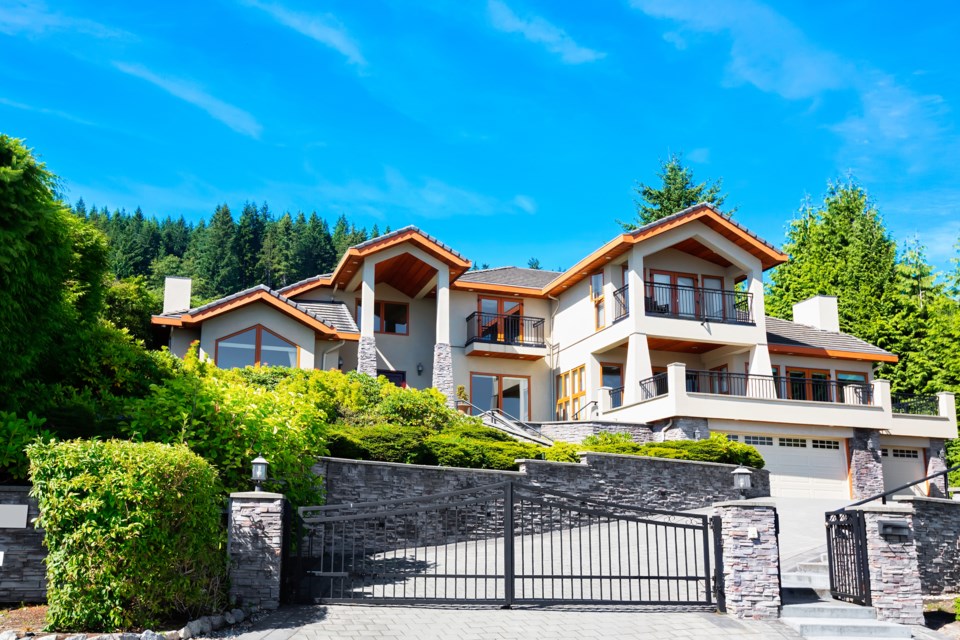Canada’s housing market may be losing steam this spring, but luxury homes and scenic cabins appear to be weathering the slowdown—just not for the same reasons.
The luxury segment of Canada’s housing market seems to be “holding up” compared with less expensive tiers, said Andrew Dinsmore, CFO with brokerage Engel & Völkers Americas Inc.
That’s partly because well-heeled clients tend to be less sensitive to changes in mortgage rates and home prices, concerned instead with larger wealth strategies, he said.
A May 7 report by Sotheby’s International Realty Canada noted a pullback in Canada’s luxury market in the first quarter, but said “segments of Canada’s metropolitan luxury real estate sector showed surprising resilience, underscoring the strength of select markets and consumer groups in the face of turmoil.”
The Greater Toronto Area saw five sales above $10 million compared with none in the same period in 2024.
But the report went onto note Montreal luxury sales over $4 million stood at eight properties sold in the first quarter of 2025, unchanged from the same period one year prior.
And in Vancouver, luxury sales above $4 million in the first quarter of 2025 declined by 48 per cent year-over-year to 33 properties sold.
Dinsmore said it’s hard to ignore the chill in this year’s spring market.
“There’s signs of a slowdown, and not just in Canada but in the U.S. and other markets as well,” he said.
For the Canadian market as a whole, actual (not seasonally adjusted) sales activity in April 2025 came in 9.8 per cent below the same month last year, according to the Canadian Real Estate Association.
Inventory also increased, with the number of properties listed for sale on all Canadian Multiple Listing Service systems at the end of April 2025 up 14.3 per cent from a year earlier, the CREA said in its latest monthly report.
Properties are also sitting on the market longer. In Vancouver, the average number of days on market increased in April 2025 for all property types compared to a year earlier, according to the Greater Vancouver Realtors professional association.
One reason for the subdued market could be a preference by consumers for liquid assets over real estate, Dinsmore said.
“Having to lock in any cash these days, especially with the economic uncertainty that we’re looking at, is a concern,” he said.
Amid concerns of a tariff-driven recession, this may actually be beneficial to some cohorts by tempering prices and necessitating rate cuts, Dinsmore said.
“Maybe in a way [they are] almost holding out for the possibility of tougher economic times,” he said.
Cabin fever
Meanwhile, a recent report delved into one niche of the market: recreational properties such as cabins in B.C. destinations like Whistler, Penticton, Summerland, Osoyoos, North Okanagan, Tofino and Ucluelet.
Like luxury real estate, cabins are also doing OK, but for different reasons.
“We’re still seeing a pretty balanced market,” said Kingsley Ma, Vancouver-based area vice-president with Re/Max LLC.
A May 12 report from Re/Max found that cabins, often owned by high-net-worth families as secondary homes, are now attracting other buyers interested in using them as primary residences.
“There are a lot of families that are looking for these properties,” Ma said.
“This gives the younger generation, especially with young families, a chance to go, ‘Well, maybe I can live farther as long as I have the internet connection. I get more space, I don’t have to pay as much and it’s perfect to grow my family.’”
Positives for the cabin category may include price points, investment value and proximity to nature, while negatives may include vacancy taxes, short-term-rental restrictions and inflexible employment policies binding workers to certain geographies.
“We need to wait until the tariff situation settles [and] give it a little bit more time before people have that confidence to either move into a primary home in those areas or invest into it,” Ma said.



